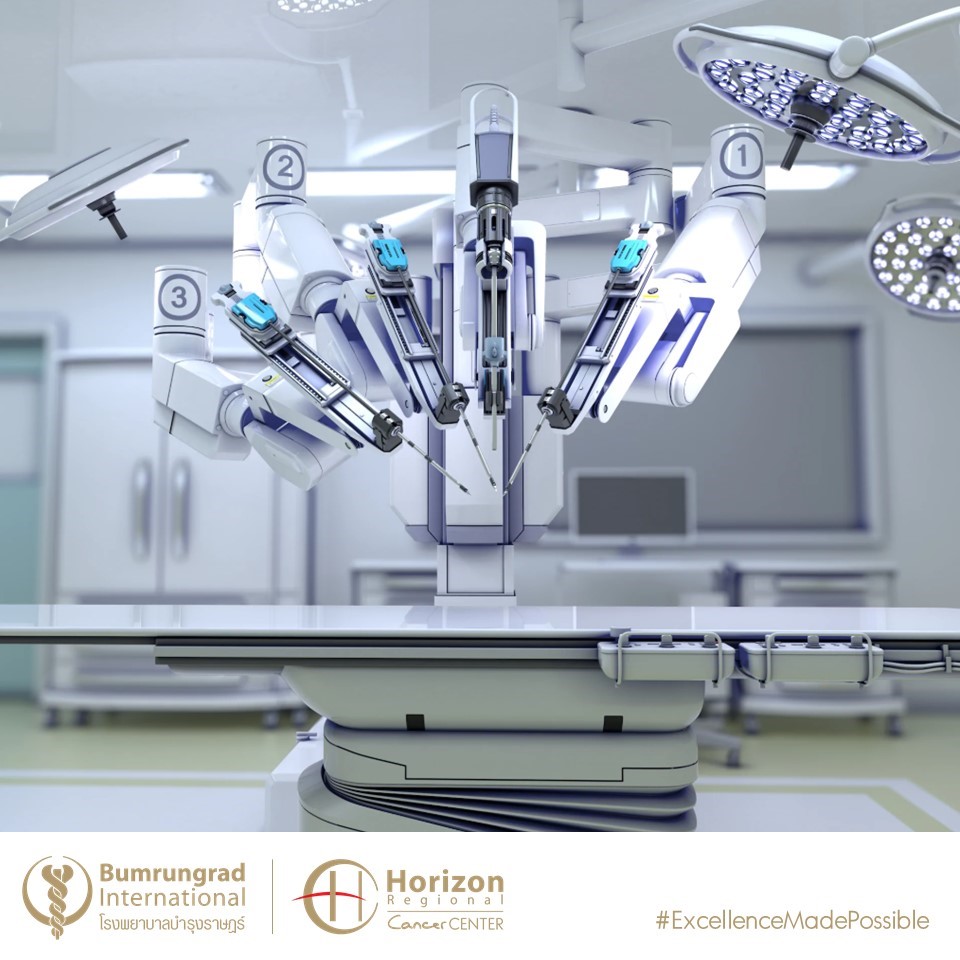“Prostate and kidney cancer are the two most common forms of cancer in the urinary tract. To date, the surgical procedures opted for treatment tend to leave both physical and mental scars in the aftermath. But with robotic surgery, patients no longer have to bear any significant kind of scarring and can go straight back to living their normal lives. Our goal is to see the patients smile and go about their normal lives after surgery, even if that just means being able to go to the toilet without any problems or having a healthy sex life; we would call that a big success.” This is the recommendation of
Dr. Teerapon Amonvesukit, an expert on minimal invasive surgery (MIS) on the urinary tract with over 20 years’ experience.
Complexity calls for precise targeting
The urinary system is a network of many organs, such as the
bladder, kidneys, and prostate. Problems in any of these organs will almost always impact the day-to-day life of the patient. Treatment of cancer in the urinary tract must therefore be especially careful and thorough.
“Abdominal surgery—otherwise known as a laparotomy—to remove cancerous tissue involves a very large incision; it must be large enough to allow the hands of the surgeon and their surgical instruments to access the area concerned. The complex risks involved mean that operating in this area of the body calls for a huge degree of accuracy, manual dexterity, and experience on the surgeon’s part.
That said, by utilizing modern methods such as keyhole surgery, which requires an incision only 1cm wide, these risks can be greatly mitigated. It puts more options on the table for the patient, and might be the only suitable for patients with certain physical conditions.” Dr. Teerapon explains the benefits of MIS.
“When cancer is found in the urinary tract, say for example kidney cancer, the doctor will inform the patient of the facts. It is not unusual, and is indeed quite natural, for a patient to enter the denial phase upon being given the bad news.
As a doctor, it is my job to keep the denial phase as short as possible for the patient, so that treatment can commence as soon as possible. This is why the good news for their treatment are given immediately after the bad news.” Dr. Teerapon explains why patient morale is so crucial to treatment. “If the mass is on the periphery of the kidney, and is not too big, we will try to save as much of the kidney as possible. We will do our very best to explore the possibility of not removing the entire kidney, because we don’t just want to cure the patient of cancer, we also want to see them go back to living their lives as fully as possible.”
The robotic surgeon is a cool hand
 Robot-assisted surgery
Robot-assisted surgery can lend a hand in achieving the fastest recovery times, the least scarring, and the highest patient morale.
“We start by making a small incision in the abdomen and insert a camera and all the surgical instruments required into the patient.
The robotic arms and surgical instruments attached are controlled in real time with high precision by the hand, wrist, and finger movements of the surgeon. The images from the robot’s cameras are rendered into an ultra-high-definition 3D image, giving clear close-up views of the internal organs, blood vessels, right down to each individual nerve ending. This makes for a highly precise surgical operation,” Dr. Teerapon details.
“Surgery to remove cancer mass from the kidney comes with one major limitation; after the mass has been cut out, the stitching together of the remaining kidney must be completed while there is no blood circulation to the kidney. We have to use clamps to stop the blood flow prior to the main act of cutting out the mass, and the entire operation cannot take more than 30 minutes to complete. The robotic surgeon makes this operation a breeze, even when time is of the essence.”
You’re only as good as your team
“The one thing that gives our patients the greatest peace of mind is the readiness and expertise of our specialist teams. For example, the lead cardiologist will confirm the patient’s cardiovascular readiness prior to surgery. Expert pharmacists will prepare medication to suit the patient’s physical condition in tandem with the highly experienced anesthetists, who will ensure that the patient is in no pain. Specially trained nurses prep the robot for surgery, and the robot itself is overseen by technicians for the duration of the operation. All bases are covered, and everyone is as ready as they can be,” Dr. Teerapon gives a snapshot of the multidisciplinary team in action at the Horizon Regional Cancer Center.
A treatment supermarket for the patient
“Our patients are our family.
If the patient can smile and go about their normal life after surgery, even if that just means being able to go to the toilet without any problems or having a healthy sex life, that is a big success for us. When the patient feels that nothing is amiss, we know we’ve done a satisfactory job,” the doctor smiled. “If the patient sees this place as a supermarket for treatment, then it’s our job as doctors to supply them with the best selection of treatments possible.”
For more information please contact:
Last modify: May 05, 2025